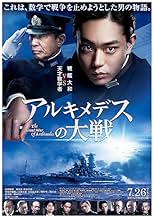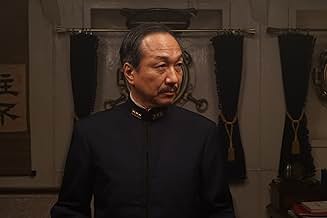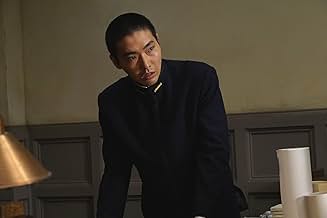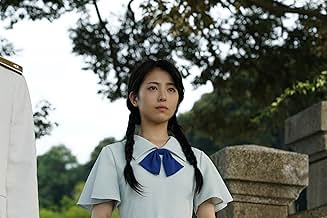Arukimedesu no taisen
- 2019
- 2 घं 10 मि
IMDb रेटिंग
6.7/10
1.3 हज़ार
आपकी रेटिंग
अपनी भाषा में प्लॉट जोड़ेंIn 1933, a young naval officer and math prodigy uncovers a conspiracy regarding the construction of Japanese warships for the ongoing World War 2.In 1933, a young naval officer and math prodigy uncovers a conspiracy regarding the construction of Japanese warships for the ongoing World War 2.In 1933, a young naval officer and math prodigy uncovers a conspiracy regarding the construction of Japanese warships for the ongoing World War 2.
- पुरस्कार
- 4 कुल नामांकन
T.J. Anthony
- Osami Nagano
- (English version)
- (वॉइस)
Luis Bermudez
- Mr. Osato
- (English version)
- (वॉइस)
Jacob Eiseman
- Various Soldiers and Walla
- (English version)
- (वॉइस)
Alex Hom
- Shojiro Tanaka
- (English version)
- (वॉइस)
Chase Kloza
- Additional voices
- (English version)
- (वॉइस)
Lizzy Laurenti
- Walla
- (वॉइस)
Nicholas Markgraf
- Additional Voices
- (English version)
- (वॉइस)
- …
फ़ीचर्ड समीक्षाएं
I found this movie to have an interesting mix of historical and fiction in the events portrayed. The CGI used in some sections is fairly good, but could have been better, which I assume is related to the production budget. The acting seems to be somewhat exaggerated in gesture and vocalization. There are some technical faults in the battle scene and in the sinking of the ship, but they do not detract from the imagery - only a 'purist' would point them out. The English dubbing takes some getting used to from the synchronicity of the face and words. Listening in Japanese and having English subtitles is easier to watch.
This is a fictionalized story is based on a manga and is not meant to be historically accurate. The first exciting 15 minutes of the movie made me think it was a war film. Instead it is a tale of a mathematician, who 9 years before the battle, tried heroically to prevent a money wasting battleship from being built for Japan's pre-WW2 navy instead of a carrier built on behalf of the forward thinking General Yamamoto.
The attack on the battleship at the beginning was well done and exciting. The main character ,played by Masaki Suda, gives an award-winning quality performance. The rest of the cast is good as well. Watching it in the original Japanese will better reflect their performances. There are some not so believable elements that you'll need to put aside in order to better enjoy the film. The final act has a poignant and surprising twist.
The attack on the battleship at the beginning was well done and exciting. The main character ,played by Masaki Suda, gives an award-winning quality performance. The rest of the cast is good as well. Watching it in the original Japanese will better reflect their performances. There are some not so believable elements that you'll need to put aside in order to better enjoy the film. The final act has a poignant and surprising twist.
I watched the Japanese language version of this movie last night and was impressed with the Japanese cast and their performances. I was unaware that an English dub existed until doing a little research today.
After watching the English dub, I was impressed by all of the English dub actors except for one. The most important one. I'm referring to the lead role of Tadashi Kai originally (well) played by Masaki Suda. Suda's performance was both impressive and expressed the realism that should be expected of a lead actor.
However: The English voice actor chosen to portray the character of Tadashi Kai did a huge disservice to the entire tone of the role. While I will give "Derick Snow" exceptionally high marks for his many performances as a dub actor in the wonderful world of Japanese Anime, his portrayal of "Lt. Commander Tadashi Kai was both childish and demeaning. Snow made the lead actor in this movie sound like a pansy. It was actually quite embarrassing. One can only hope that Masaki Suda never hears how he was portrayed by an American actor.
You may say that this is one man's opinion, and you would be correct. However I have made my living using my own voice in the broadcast media industry for more years that I care to count these days. Hate me if you will, but I stand by my words.
Just another voice in the crowd :)
After watching the English dub, I was impressed by all of the English dub actors except for one. The most important one. I'm referring to the lead role of Tadashi Kai originally (well) played by Masaki Suda. Suda's performance was both impressive and expressed the realism that should be expected of a lead actor.
However: The English voice actor chosen to portray the character of Tadashi Kai did a huge disservice to the entire tone of the role. While I will give "Derick Snow" exceptionally high marks for his many performances as a dub actor in the wonderful world of Japanese Anime, his portrayal of "Lt. Commander Tadashi Kai was both childish and demeaning. Snow made the lead actor in this movie sound like a pansy. It was actually quite embarrassing. One can only hope that Masaki Suda never hears how he was portrayed by an American actor.
You may say that this is one man's opinion, and you would be correct. However I have made my living using my own voice in the broadcast media industry for more years that I care to count these days. Hate me if you will, but I stand by my words.
Just another voice in the crowd :)
First it must be stated that this in no way is a 'war movie' as most think of it. The only direct depiction of battle occurs in the beginning of the movie, and as others have said requires some background knowledge of the actual history to grasp what is being depicted. However, I found it striking (and others without the historical knowledge can do likewise) to think back on this scene after the architect describes the ship's purpose later in the movie. I have no idea how accurate the movie is in depicting the actual sentiment's of the architect, but regardless it struck me and made me rethink how I viewed the construction of the ship in question.
At this point it must also be said that the dubbing of the movie does it no favors (besides not requiring a fluency in Japanese to view). The dubbed voices of all figures accept Yamamoto seemed to me to often not reflect the sentiments of the action depicted, which does detract from the viewing experience. However, they do serve to make the movie understandable for non-Japanese speakers such as myself, and for that at least I am grateful. I'm not sure if it is possible to watch the movie in Japanese but simply with English subtitles, but it is something to look into if you find the dubbing too jarring to watch the movie otherwise.
Returning to the rest of the movie, it follows the discussion of how the Imperial Japanese Navy (IJN) planned to expand during the 1930s, when war with the world was not yet actuality, but could be seen on the horizon. It therefore closely examines (with a background of the internal politics of the Japanese armed forces) the debate over two potential paths of expansion, and the costs behind each one. Cue the wiz-kid with a knack for numbers, called in to question the expected costs of one of the plans. And here is where the viewer intent on a stereotypical war movie will lose interest; but for those who continue watching, they will likely leave with a much greater appreciation for all of the abstract mathematical concepts they suffered through in school (I know I for one left seeing much better the usefulness of optimization and regression than when I began). This is a war movie that considers the intellectual backing of the effort, whether that be calculations, counterintelligence, or even how to effectively utilize (or counter if need be) the underpinnings of a nation at war; and that is not something with a terribly large audience of interest. But for those interested in such things, I found the movie a terrific watch.
At this point it must also be said that the dubbing of the movie does it no favors (besides not requiring a fluency in Japanese to view). The dubbed voices of all figures accept Yamamoto seemed to me to often not reflect the sentiments of the action depicted, which does detract from the viewing experience. However, they do serve to make the movie understandable for non-Japanese speakers such as myself, and for that at least I am grateful. I'm not sure if it is possible to watch the movie in Japanese but simply with English subtitles, but it is something to look into if you find the dubbing too jarring to watch the movie otherwise.
Returning to the rest of the movie, it follows the discussion of how the Imperial Japanese Navy (IJN) planned to expand during the 1930s, when war with the world was not yet actuality, but could be seen on the horizon. It therefore closely examines (with a background of the internal politics of the Japanese armed forces) the debate over two potential paths of expansion, and the costs behind each one. Cue the wiz-kid with a knack for numbers, called in to question the expected costs of one of the plans. And here is where the viewer intent on a stereotypical war movie will lose interest; but for those who continue watching, they will likely leave with a much greater appreciation for all of the abstract mathematical concepts they suffered through in school (I know I for one left seeing much better the usefulness of optimization and regression than when I began). This is a war movie that considers the intellectual backing of the effort, whether that be calculations, counterintelligence, or even how to effectively utilize (or counter if need be) the underpinnings of a nation at war; and that is not something with a terribly large audience of interest. But for those interested in such things, I found the movie a terrific watch.
"The Great War of Archimedes" (2019) offers a captivating journey into naval politics and wartime calculations. Though visually impressive, the film's 2+ hour runtime can feel bloated at times, with repetitive sequences and drawn-out dialogues. While the central plot about a math prodigy uncovering corruption is intriguing, the pacing hinders its full impact.
Despite these shortcomings, the film's strength lies in its engaging characters and the compelling moral dilemma presented. Suda Masaki delivers a nuanced performance as the conflicted math whiz, while the supporting cast adds depth and intrigue. The film successfully portrays the complexities of war and the sacrifices demanded from individuals caught in its midst.
Overall, "The Great War of Archimedes" is a worthwhile watch for those interested in historical dramas and intricate plotlines. However, viewers seeking a fast-paced experience might find it a bit long-winded.
Rating: 7/10.
Despite these shortcomings, the film's strength lies in its engaging characters and the compelling moral dilemma presented. Suda Masaki delivers a nuanced performance as the conflicted math whiz, while the supporting cast adds depth and intrigue. The film successfully portrays the complexities of war and the sacrifices demanded from individuals caught in its midst.
Overall, "The Great War of Archimedes" is a worthwhile watch for those interested in historical dramas and intricate plotlines. However, viewers seeking a fast-paced experience might find it a bit long-winded.
Rating: 7/10.
क्या आपको पता है
- ट्रिवियाAt about 5:30, the ammunition magazines on the battleship Yamato explode, after which the capsized (inverted) bow of the Yamato rises up from the water into a vertical position before sinking. This mirrors the manner in which the future Space Battleship Yamato is destroyed in Uchû senkan Yamato: Kanketsuhen (1983), which itself was later recreated in the reboot series The Trap on All Sides (2012) (albeit her "destruction" in this case only being a ruse to deceive the enemy).
टॉप पसंद
रेटिंग देने के लिए साइन-इन करें और वैयक्तिकृत सुझावों के लिए वॉचलिस्ट करें
- How long is The Great War of Archimedes?Alexa द्वारा संचालित
विवरण
- रिलीज़ की तारीख़
- कंट्री ऑफ़ ओरिजिन
- आधिकारिक साइटें
- भाषा
- इस रूप में भी जाना जाता है
- The Great War of Archimedes
- उत्पादन कंपनियां
- IMDbPro पर और कंपनी क्रेडिट देखें
बॉक्स ऑफ़िस
- दुनिया भर में सकल
- $1,64,54,674
- चलने की अवधि2 घंटे 10 मिनट
- रंग
इस पेज में योगदान दें
किसी बदलाव का सुझाव दें या अनुपलब्ध कॉन्टेंट जोड़ें


![Trailer [OV] देखें](https://m.media-amazon.com/images/M/MV5BZmVlZWNmMmMtYmUxMy00MGQ5LWIyMTMtYTRlY2E1M2M0OWNkXkEyXkFqcGdeQXRyYW5zY29kZS13b3JrZmxvdw@@._V1_QL75_UX500_CR0)






























